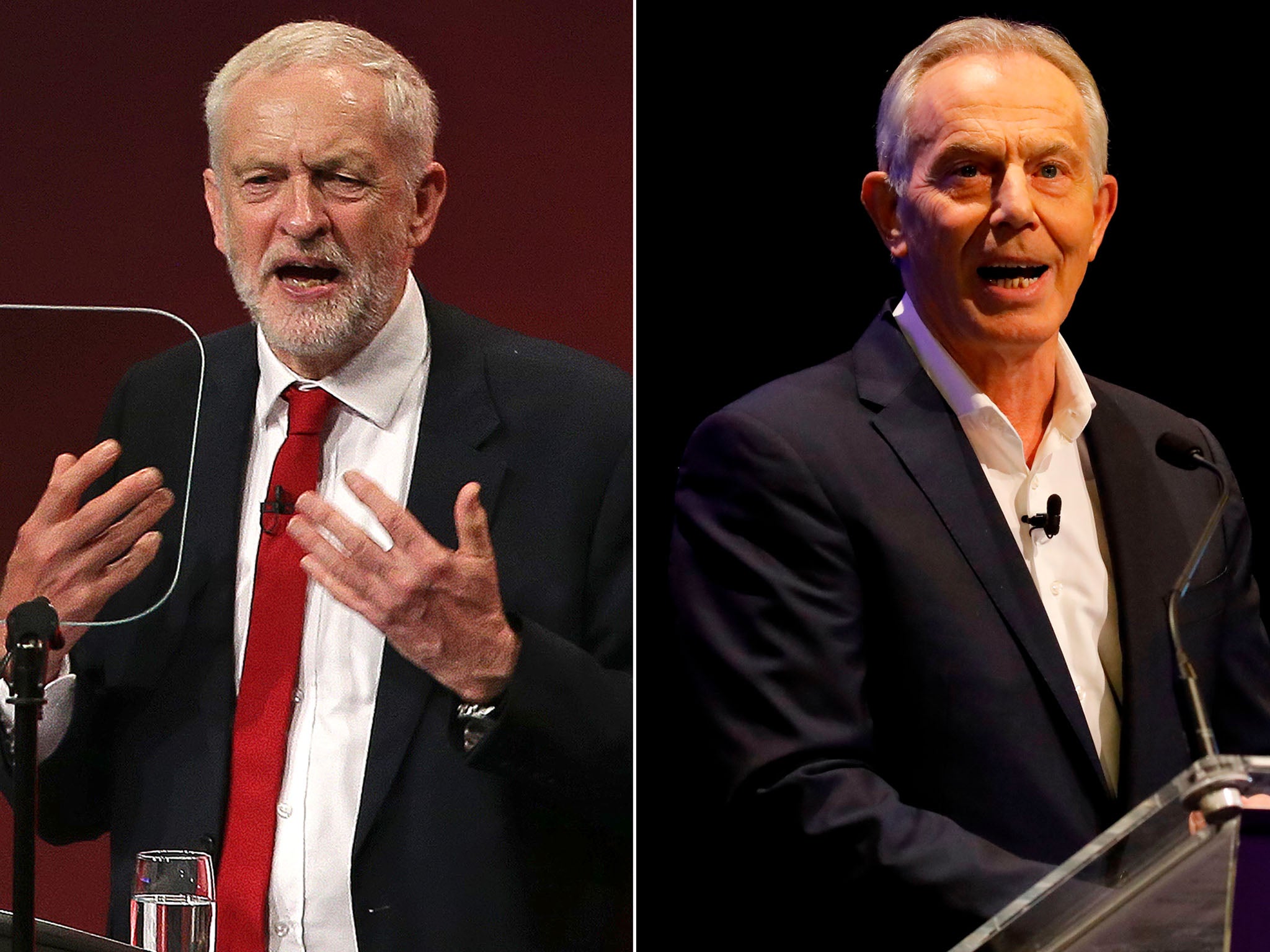How is it possible to admire both Blair and Corbyn?
John Rentoul set out to find a Labour Party member who has a favourable opinion of both former leaders

More than half – 55 per cent – of Labour Party members have a favourable opinion of Tony Blair, and 53 per cent have a favourable opinion of Jeremy Corbyn, according to a YouGov survey this month. I found this surprising, because it required the existence of party members who admired both at the same time.
I said on Twitter that I would be interested to find such a person and learn more about their views. I was contacted by a Labour member called Richard who admires both former leaders and who is happy to explain why.
“The easier part is why I supported both men as leaders of the Labour Party,” he says. “After 18 years of Conservative government, the arrival of Tony Blair as prime minister was such a breath of fresh air. There was an immediate change of tone in politics, and a progressive agenda sought. The achievements of his government were wonderful – that they could have gone further, particularly given his majorities, is obviously an open discussion point. He raised the profile of women in parliament, and tackled many inequalities in society.”
Richard thinks that Iraq was a mistake, and that this was clear “at the time, and in retrospect”. All the same, he adds: “I do not believe that Blair acted maliciously or with any criminal intent. I think he was suckered into it. And his weakness is that he could never apologise for the error of judgement that led to it.”
So it does not seem to have been anti-war sentiment that drove Richard towards Corbyn; it was more the length of time Labour was in office: “As with all governments, a certain staleness set in after a while, and the bravery was lost. A lack of direction crept in and there was a drift in both personalities and policies. This drift continued with Brown, who with the global economic crisis had other things on his hands. Ed Miliband came with good credentials, but was lulled into a soft left meaningless drift. It was well intentioned, but as he neither looked a leader, nor seemed to have the conviction that he needed to be seen to have, he was ultimately a failure.”
That meant Jeremy Corbyn offered the party “a new sense of purpose”, according to Richard. He “spoke from the heart”, his rebellions against the leadership over the years being “a sign of what he was – the conscience of the party”.
Richard says: “In a drifting party, he was the clarion call needed to arms – to remember the radical achievements of the Labour movement in the past, and to question why they could not happen again. He spoke with vigour unseen by the party in many years, and enthused the young with his fierce attacks on the government.”
Corbyn also made mistakes, Richard thinks. “When somewhere over 80 per cent of the Jewish populace think that something is antisemitic, I suspect we need to believe them. They have some experience in this matter.” Yet, says Richard, “Corbyn is clearly not an antisemite himself. His actions would show this to be a nonsense. However, there are those around him who have supported the rights of Palestinians to the extent of blurring where the political state of Israel and its actions end and the Jewish people begin. He also, without question, spent time with people whose opinions are unacceptable. This, ultimately, looked like antisemitism. Because it is.”
Corbyn’s defect is similar to Blair’s, in Richard’s view: “Both men are intransigent, stubborn even. This may go some way to explain their success amongst the zealots of their respective tribes.” It is also a cause of their weakness, namely being unable to admit their mistakes.
Richard, a 50-year-old white, middle-class party member who joined around the time of the 2017 election, and who has “rarely” voted other than Labour, says the party and the movement “has always been a coalition of different concerns and ideologies”. He hopes to find a “progressive alliance” to beat the “seemingly unstoppable force that is the Johnson government”, which means realising that “the Labour Party is in itself a progressive alliance, and needs to embrace the differing wings of the party”.
His aim is “to find a commonality that will allow us to forge a strength that will translate to electoral success. And to dismiss either Blair or Corbyn is to ignore not only a swathe of the party and party members, but of the electorate itself. I never forget who the real political enemy is here: the Conservative Party and its policies.
“Which is why I voted, sometimes happily and sometimes with reservations, for both of them as leader of the Labour Party.”
Finally, he says he voted for Keir Starmer as leader last year, adding: “While I continue to support him, he is weak in the face of his task, not because of an underlying lack of stamina or belief on his own part, but because of a lack of charismatic blade to cut through and damage the moral vacuum that is Johnson and his government.”
Perhaps he is an example of a floating voter within his own party.
Subscribe to Independent Premium to bookmark this article
Want to bookmark your favourite articles and stories to read or reference later? Start your Independent Premium subscription today.

Join our commenting forum
Join thought-provoking conversations, follow other Independent readers and see their replies